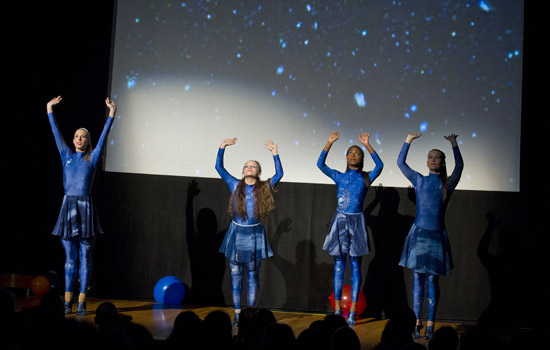AstroDance blends art and physics
Show blends science, art and technology into a stunning performance
A. Sue Weisler
AstroDance blends live dancers, narration, multimedia imagery and film to create an experience that is both educational and entertaining.
AstroDance, an innovative multimedia performance that uses dance to tell the story of black holes and the gravitational pull of particles in the universe, is being performed twice during the Imagine RIT: Innovation and Creativity Festival on May 4.
AstroDance blends live dancers, narration, multimedia imagery and film to create an experience that is both educational and entertaining. The show was created and choreographed by Thomas Warfield, director of dance at the NTID. AstroDance is a joint project between RIT’s College of Science, the B. Thomas Golisano School of Computing and Information Sciences, and NTID’s Performing Arts program, and intends to provide deaf, hard-of-hearing and hearing children and adults with general information and basic concepts from the fields of gravitational physics and astrophysics while engaging them in an enjoyable and interesting theatrical experience.
“I think what the audiences are surprised about is how much they can actually retain about basic astrophysics terminology and even about Einstein’s relativity theory just from the visual learning that happens through watching the dance,” Warfield says.
Funded by the National Science Foundation, AstroDance premiered at the inaugural First National Rochester Fringe Festival to rave reviews and a sold-out house. The show is in the middle of a tour throughout the northeast U.S., focusing on mixed audiences of deaf and hearing individuals.
Warfield says the two performances scheduled for the Imagine RIT festival are expanded slightly from their road performances and last about an hour.
Performances are free and scheduled at 11 a.m. and repeated at 2 p.m. in Ingle Auditorium in the Student Alumni Union.
AstroDance features a cast of both deaf and hearing dancers against a backdrop of spectacular animated galactic imagery produced by RIT computer scientist Hans-Peter Bischof. RIT astrophysicist Manuela Campanelli, Insight Lab Director Jake Noel-Storr and several other RIT artists and scientists also worked to create AstroDance.
The project is intended to engender an appreciation for science and technology and generally enhance audience members’ interest in science, technology, engineering and math fields. The experience is highly visual and fully accessible to deaf, hard-of-hearing and hearing audiences.
“The mere fact that the dancers portray a broad range of dance styles—jazz to modern to hip-hop to ballet on pointe shoes—is a ‘wow’ in itself, especially at a technical university,” Warfield says. “I think ultimately I want the audience to leave with an expanded perspective on how to view and understand both science and dance and perhaps realize that the right and left brain are really a team. And whether we work in the arts or science or technology, we engage our full brain as a whole in every area of discipline we undertake.”
For more information or to plan your day at the festival, go to the Imagine RIT website.














